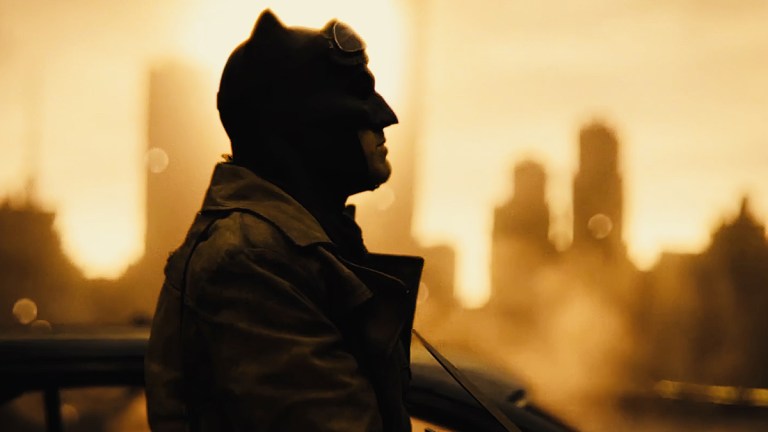Ben Affleck’s Canceled Batman Movie Was Much Bigger Than We Thought
New information about Ben Affleck's canceled Batman movie suggests that the film would have been about a lot more than a fight against Deathstroke.

“I often wonder,” the Joker chides Batman, staring at his enemy through the haze of a post-apocalyptic desert. “How many alternate timelines do you destroy the world because, frankly, you don’t have the cojones to die yourself?”
For fans of the Snyderverse, that little tidbit from Zack Snyder’s Justice League felt like a cruel tease, a reference to multiversal adventures that would never actually arrive on screen. Most fans likely assumed that the original plan was for these stories to unfold in a Justice League sequel, possibly one pitting Batman against Superman and Darkseid to create the oft-glimpsed Knightmare reality.
But according to information from someone close to the project, some of those larger ideas about Batman would have been explored in the solo film that Ben Affleck was originally tapped to direct, write, and star in. Planned as a continuation of Snyder’s first set of DCEU films, Affleck’s movie was once slated to release sometime in 2018 and would have pit Affleck’s older, more grizzled Dark Knight against Deathstroke the Terminator, played by Joe Manganiello. But it was apparently about a lot more than that.
According to storyboard artist Jay Oliva, the canceled film would have actually been much larger in scope than we thought, based on the draft he read from Ben Affleck and comics veteran Geoff Johns. Legally, Oliva still can’t say too much about the movie, but he did tell Inverse that the film had grand ambitions. “It was fucking awesome,” Oliva enthused. “It was the best. It was amazing.”
“I’ve worked on a lot of Batman things and what was really cool about it was, it was tying together a lot of really cool Batman storylines that had never been really explored,” Oliva claimed. “Ben’s story was gonna cover something that had never really been covered in comics but was building off of storylines in the Batman mythos over the last 80 years and approaching it from a new kind of perspective.”
Batman’s history, which began with his first appearance in 1939’s Detective Comics #27, has always been a challenge for storytellers, and not just because of DC’s willingness to reboot its comics universe. Batman stories have varied wildly in tone over the years, sometimes portraying him as a dark creature of the night, even willing to kill his enemies, sometimes portraying him as the chummy head of an extended family of costumed heroes, sometimes making him a good man who tries hard to deal with his trauma, and sometimes turning him into a fascist almost as unhinged as his enemies.
Most comics writers tend to pick a specific version and tone for their Batman runs, ignoring other aspects of the character’s history in order to tell a coherent story. But then there’s Grant Morrison, whose fan-favorite run basically established that every Batman story was canon, no matter how outlandish or how poorly it fit with the rest of the modern continuity. More recently, writer Chip Zdarsky sent Batman on his own version of the Spider-Verse, in which the Prime Bats met alternate versions, including one from The Animated Series and Michael Keaton’s movie Batman.
Oliva insists that Affleck’s movie would not have followed the beats of any specific comic or writer, but it does sound like it would have brought in a lot more of the character’s history to the screen. But when Affleck decided against directing the picture, Matt Reeves took his place and decided on a different approach for his Dark Knight, instead establishing a younger Caped Crusader in The Batman set in a completely different universe than the Snyder movies.
The surprise cameo at the end of The Flash only further cements the end of Affleck’s Batman era. But these reveals give us a glimpse of the Batman movie we could have had, maybe in an alternate timeline.
